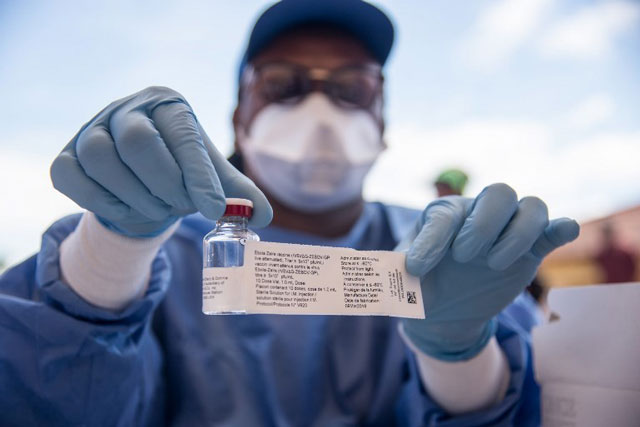
Kasese, Uganda | THE INDEPENDENT & UN NEWS | A significant phase in the battle against the Ebola epidemic in neighbouring Democratic of Congo (DRC) started this week, with a visit of the head of the World Health Organization (WHO) to the epicenter in Beni, and first ever vaccinations locally for frontline workers.
Who, and Ugandan Ministry of Health, have begun vaccinating health workers in the country against Ebola, in a bid to stop an outbreak in the neighbouring Democratic of Congo (DRC) from crossing the border.
The exercise, which began on Tuesday, is centred around five high-risk districts of Uganda that border the DRC (Bundibugyo, Kabarole, Kasese, Ntoroko and Bunyangabu) and involves the administering of 2,100 doses of vaccine to health workers, protecting them against the particular strain of Ebola currently circulating in some parts of DRC.
Uganda is the first country in the world to give the vaccine against Ebola without experiencing an active outbreak. The vaccine, is already being given out in the DRC.
No Ebola in Uganda, but health workers ready for battle
No cases of Ebola have so far been reported in Uganda, but the authorities are implementing the plan in order to avoid the fatal consequences of previous outbreaks, which saw health workers contract the disease and die as they cared for patients.
WHO said in a statement released on Wednesday that it is “highly likely” that Ugandans in districts near the border will be infected with the virus, due to their close proximity to the epicentre of the outbreak, and high population movements due to trade, social and cultural connections and the relatively easy access to health services.
Dr Yonas Tegegn Woldemariam, WHO Representative in Uganda, referred to the vaccination as a huge step in mitigating the risk of Ebola among health care workers, and assured them that it would provide effective protection.
@MinofHealthUG @WHOUganda & local authorities’ Ebola vaccination teams heading to one of the #PoEs and #HealthFacilities in Ntoroko to vaccinate Frontline Health and other workers. There is NO CONFIRMED #EBOLA #EVD case in #Uganda. pic.twitter.com/jGnGtrXwaM
— Yonas Tegegn WOLDEMARIAM (@tegegny) November 10, 2018
The #Ebola vaccination teams had to walk 6 kilometres to deliver vaccines to one of the Points of Entry in Ntoroko District. #Uganda pic.twitter.com/4vzqnikuEm
— WHO Uganda (@WHOUganda) November 10, 2018
The deteriorating security situation in the DRC has complicated efforts to get the Ebola outbreak under control: across the country, local populations and humanitarian workers assisting them have come under attacks by armed groups, necessitating the deployment of a large UN peacekeeping mission.
A WHO assessment of the situation in DRC released on 22 October, warned of the potential for the virus to spread into Rwanda, South Sudan and Burundi, as well as Uganda, and called on these countries to step up readiness efforts.
Other preparatory activities underway in Uganda to prevent the spread of the disease include health facility and community-based surveillance; collection and testing of blood samples; and cross-border monitoring.
UN Peacekeeping, WHO chiefs praise courage of Ebola responders
Both WHO Director-General Tedros Adhanom Ghebreyesus, and Peacekeeping chief Jean-Pierre Lacroix were in the epicentre of the outbreak area on Wednesday, Beni, in DRCs North Kivu district.
They met local authority leaders, UN agencies, civil society and first responders to assess the situation on the ground and to discuss ways to strengthen the response. So far there have been 311 reported cases of Ebola since the outbreak in the restive east began.
.@DrTedros arrives with @Lacroix_UN in Beni the epicentre of the response against #Ebola in the #DRC to meet with 1rst responders & see first hand what’s happening. pic.twitter.com/xiCKUVlu5J
— WHO African Region (@WHOAFRO) November 7, 2018
.@WHO has 280 staff in North Kivu, #DRC ??, supporting hundreds more from the @MinSanteRDC & partners. Six #Ebola treatment centres have been built, each with a mobile laboratory to rapidly diagnose cases & guide treatment. https://t.co/XNXbaTRrGS pic.twitter.com/M9ITS5oIZs
— Tedros Adhanom Ghebreyesus (@DrTedros) November 8, 2018
WHO chiefs in DRC
The Director-General and Mr. Lacroix praised the responders’ courage and determination and emphasized the numerous challenges, including security, particularly for women.
Mr. Lacroix said that health workers in the affected zones do crucial work amidst a difficult security environment and that the UN Mission in the country (MONUSCO) is actively supporting the Government to improve security.
“It is first and foremost the work of a very close-knit team comprised of WHO, MONUSCO and other agencies with the DRC government authorities who are very mobilized,” he said. “It is starting to produce results even if , as the Director General of the WHO said earlier, there are still cases every day, but the slope suggests that we will be able to contain the epidemic. The problem is that the security environment has worsened.”
He added that the continuing actions of armed groups “calls for a stronger closely coordinated response, and we are working in a very coordinated manner with the Congolese security forces, but the adversary is a more difficult adversary that knows the ground that is blending into the population. The peculiarities of the terrain also make the operations very complex. We are working to improve the effectiveness of our response, the means, the training, and the knowledge of the groups. I think we will obtain results.”
Tedros said the work being done around the clock to end Ebola made him proud and confident that the outbreak would be defeated despite the numerous challenges.
*****
SOURCE: UN NEWS
 The Independent Uganda: You get the Truth we Pay the Price
The Independent Uganda: You get the Truth we Pay the Price






It’s just a matter of time Ebola will spread to neighbouring countries and you know why?
https://www.modernghana.com/news/896308/the-corrupt-kabila-and-the-approval-of-ebola-vaccine-trials.html